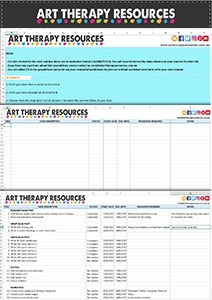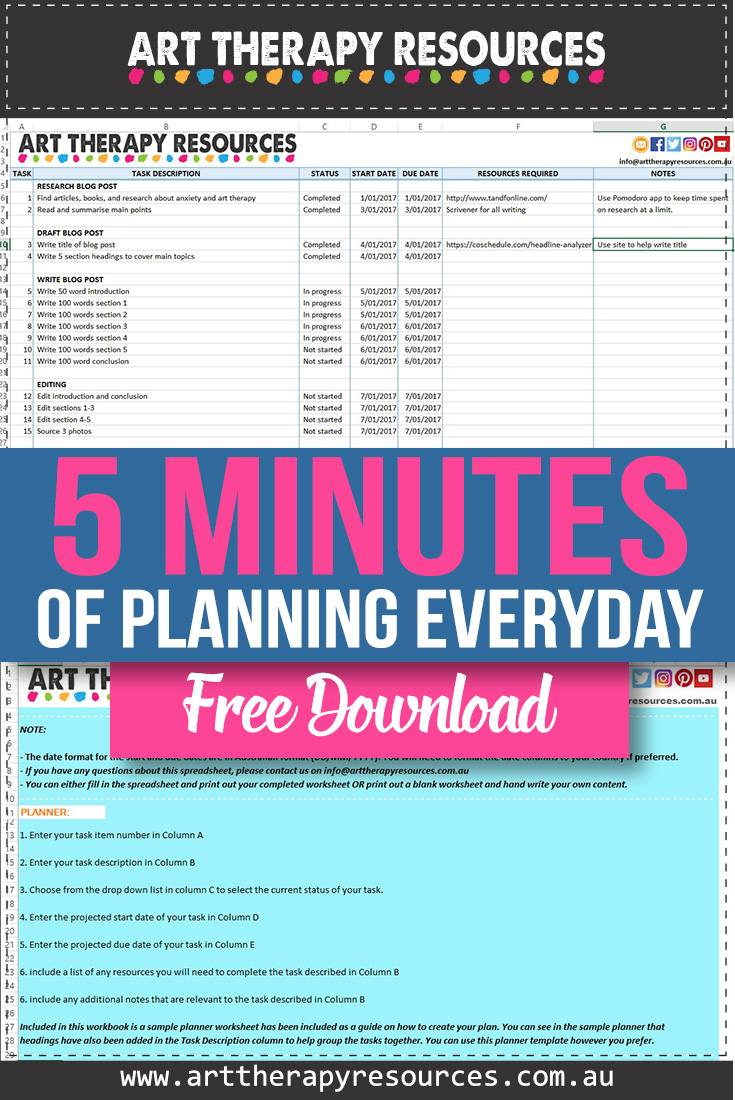THIS POST INCLUDES:
1. Benefits of planning everyday
2. How to structure your day as a therapist
3. When things don’t go to plan
4. Free Download Planning Template
BENEFITS OF PLANNING EVERYDAY
Everyday life can be busy for an art therapist. This statement is true of almost every profession, however, therapists need to regulate and monitor their day due to the nature of client work that involves being exposed to potentially stressful and emotional work.
Working to set your routine can have significant benefits to help keep you grounded in expectations and the demands for your day ahead. Setting aside 5 minutes at the beginning of each day to plan out your schedule and tasks for the day can help develop a purposeful routine.
Your 5 minutes of planning can include regular tasks such as:
- reviewing your schedule for upcoming appointments
- preparing for any therapy sessions or meetings
- making a list of any administrative tasks that need to be completed
- plans for self-care that day
There are several benefits of planning every day, including:
- Increased productivity – planning helps you prioritize tasks and manage your time more effectively, so you can get more done in less time.
- Reduced stress – a plan helps to reduce uncertainty and anxiety and makes it easier to handle unexpected events.
- Greater sense of control – planning helps you take control of your day instead of feeling like things are happening to you.
- Improved focus – when you have a plan, it’s easier to stay focused on the task at hand, rather than getting distracted by other things.
- Better goal attainment – By planning your day, you can work towards your longer-term goals in smaller steps, making them feel more manageable and increasing the chances of achieving them.
- Improved time management – By planning your day, you can better manage your time and be more efficient in completing tasks.
Developing a 5 minute planning routine can help you stay organized, focused, and well-prepared for your work day ahead. However, it’s important to remember that a 5 minute planning session should not be focused on creating complex plans or major projects.
A 5 minute planning routine should focus on preparing you for the day ahead.
HOW TO STRUCTURE YOUR DAY AS A THERAPIST
As a therapist, structuring your day can help you stay organized, focused, and prepared for your work. Below is an example of how you might structure your day in a 5 minute planning session:
CLIENT WORK: Review your calendar for upcoming appointments. Take note of any clients that require specialised equipment, art tools, or assessments to prepare for in your session.
ADMINISTRATION: Set aside a specific time for administrative tasks such as returning phone calls, billing, and paperwork. If you have a backlog of administrative tasks to complete, choose one or two that you can easily achieve on that day. Administrative work can feel like a non-productive part of your day if you are focused on client work. However, putting a few minutes toward your admin work each day can provide cumulative benefits by keeping momentum.
OTHER PROJECTS: this may only apply if you have a day ahead that allocates time for working on projects. Make a note of the project you are working on and then choose a specific task to work on for that project. This might be preparing notes, creating a marketing plan, posting on social media. The more specific you are about the tasks you will complete in your project, the more efficient you will be at working toward completing your project.
SELF-CARE: Set aside time for self-care and self-reflection: As a therapist, it’s important to take care of yourself both physically and emotionally. Schedule time for self-care activities such as exercise, art, meditation, or journaling.
Remember to be flexible. Therapy sessions can be unpredictable, and emergencies can happen. Try to build flexibility into your schedule to accommodate unexpected events or urgent matters.
Regularly evaluate how your schedule is working for you, and make adjustments as needed. Make this evaluation on a daily basis as well as on a weekly basis. You may start to gain insights into how you work best. For example, you may find that you prefer completing admin work at the start of the day before any client work occurs.
By following these tips, you can structure your day in a way that allows you to be fully present for your clients while also taking care of yourself, your practice, and your other responsibilities.
WHEN THINGS DON’T GO TO PLAN
When things derail your plans for the day, there are several steps you can take:
- Remain calm and assess the situation: Take a moment to understand what has happened and what needs to be done.
- Prioritize: Determine which tasks are most important and need to be done first.
- Be flexible: Be willing to adjust your plans as needed in light of new information or unexpected events.
- Communicate: Let others know about the change in plans and ask for help if needed.
- Stay focused: Try to stay focused on the task at hand, rather than getting distracted by other things.
- Learn from the experience: Use the experience to learn and grow, and to improve your planning for the future.
It’s important to remember that things don’t always go as planned, and being able to adapt and adjust is a key skill. Stay positive and don’t let setbacks discourage you, focus on what you can do and move forward.
FREE DOWNLOAD
SIGN UP below to download the FREE planner template to help you plan your day as a busy therapist.

BUILD YOUR ART THERAPY REFERENCE MATERIALS:
Pin this image to your Pinterest board.

SHARE KNOWLEDGE & PASS IT ON:
If you’ve enjoyed this post, please share it on Facebook, Twitter, Pinterest. Thank you!
